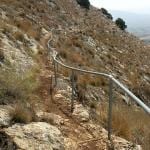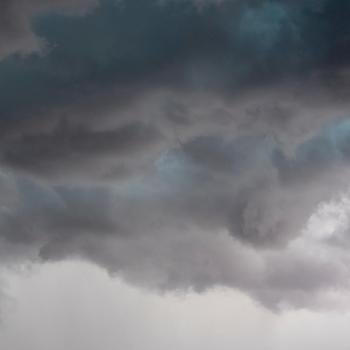In undergraduate, I took a class in mythology and learned that all of these monsters teach us something we’d rather not know about ourselves and our culture– that is why people tell myths, after all: to teach each other the things that are too terrible to speak about in ordinary speech.
A monster is something that tells you what’s wrong with you, and with the world around you.
In graduate school I tried to learn Latin, and I didn’t get very far. But I did learn that the English word “monster” comes from the Latin verb “monstro–” to teach, to point out, to reveal, to show, to make apparent. That’s where we get the word “demonstration;” to demonstrate is to give a practical exhibit and explanation, making something apparent. That’s why the container for the Eucharist that has a window in it is called a monstrance: because Christ is hidden in the tabernacle or the ciborium but revealed in a monstrance.
“Monstrum,” the noun form of the same word, means “evil omen.” The Romans thought that when a human or animal was born with an ugly deformity, that was an omen that evil was afoot. That’s why they also called deformed and ugly creatures, “monstrum.” And so do we– we call them monsters.
A monster is a thing that scares you so badly, you feel you can’t face it unless you’re hiding. A monster is a thing that is so dangerous, we have to conjure up heroes to kill it even if it’s not doing anything wrong. A monster is a thing that shows us who we are, and what’s wrong with our society. “Monstro” is the act of pointing out, revealing, making apparent; and a monster is an omen that evil is afoot.
The perpetrators of the Holocaust were not monsters. If they had been, they wouldn’t have perpetrated the holocaust. They would have pointed it out. They would have relentlessly called people’s attention to what was going on around them and declared that it was wrong. And that would have scared people to death, and the people would have killed them to shut them up, so that they could go on doing what they were sure was necessary.
Indeed, that’s what happened to some people. Plenty of people in Germany at the time of the Shoah were monsters. Think of Sophie Scholl and the other members of the White Rose. They were so monstrous to the Nazis that the Nazis beheaded them. Others in Germany demonstrated against what the Nazis were doing, and the Nazis rounded them up and killed them too. They were dangerous. They insisted that evil was afoot. They pointed to what the Nazis wanted to do. They tried to make it apparent. They said that it was wrong, and this was scary, because so many people had convinced themselves that it was necessary. And there is nothing in the world more terrifying than someone pointing out that a course of action you’ve decided is necessary for your own safety and comfort is evil, and must be stopped. There’s nothing more terrifying that a person who reveals the sins that society tries to keep hidden.
A person who tells the truth, is a monstrous person indeed.
So the Nazis killed them, and made themselves out to be heroes for killing the monsters.
1.1 million people were murdered at Auschwitz.
Six million Jews were murdered in the Shoah.
The Nazis also murdered three million Soviet prisoners of war, 1.8 non-Jewish Polish civilians, 312,000 Serbs, 250,000 disabled persons, about 200,000 Roma, almost 2000 Jehova’s Witnesses, and unknown thousands of homosexuals.
The total death toll of World War Two, was about 85 million.
Perhaps if there had been many more monsters in Europe at the time, this wouldn’t have happened.
I don’t know what the critical mass is, for monsters. I don’t know how many monsters in the population are enough to stop genocide from happening. But I know that it’s part of our duty– as Christians, as people of goodwill of any faith, as anyone who believes that humans are equal and must not be hurt– that we have to be monsters. We have to be willing to be ominous, scary, inconvenient people who are not afraid to point to the grave evils that our culture refuses to call evil. Of course we shouldn’t blabber and gossip about things that are nobody’s business, nor should we go looking for evil where there is none. But when it comes down to the wire and lives are in danger, we have to be willing to be monsters– people who point out. And we must keep pointing it out, even when we scare others, even when they try to kill us.
The perpetrators at Auschwitz weren’t monsters; they were ordinary people. And that’s why they ended up murdering their neighbors, you see– because they ought to have been monsters, and instead they chose to be ordinary people, just doing what they were told.
Let us pray for the grace to be monsters.
(image via Pixabay)













